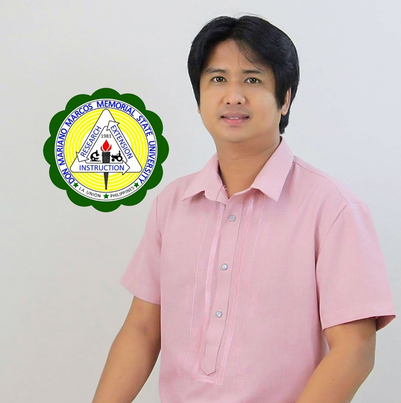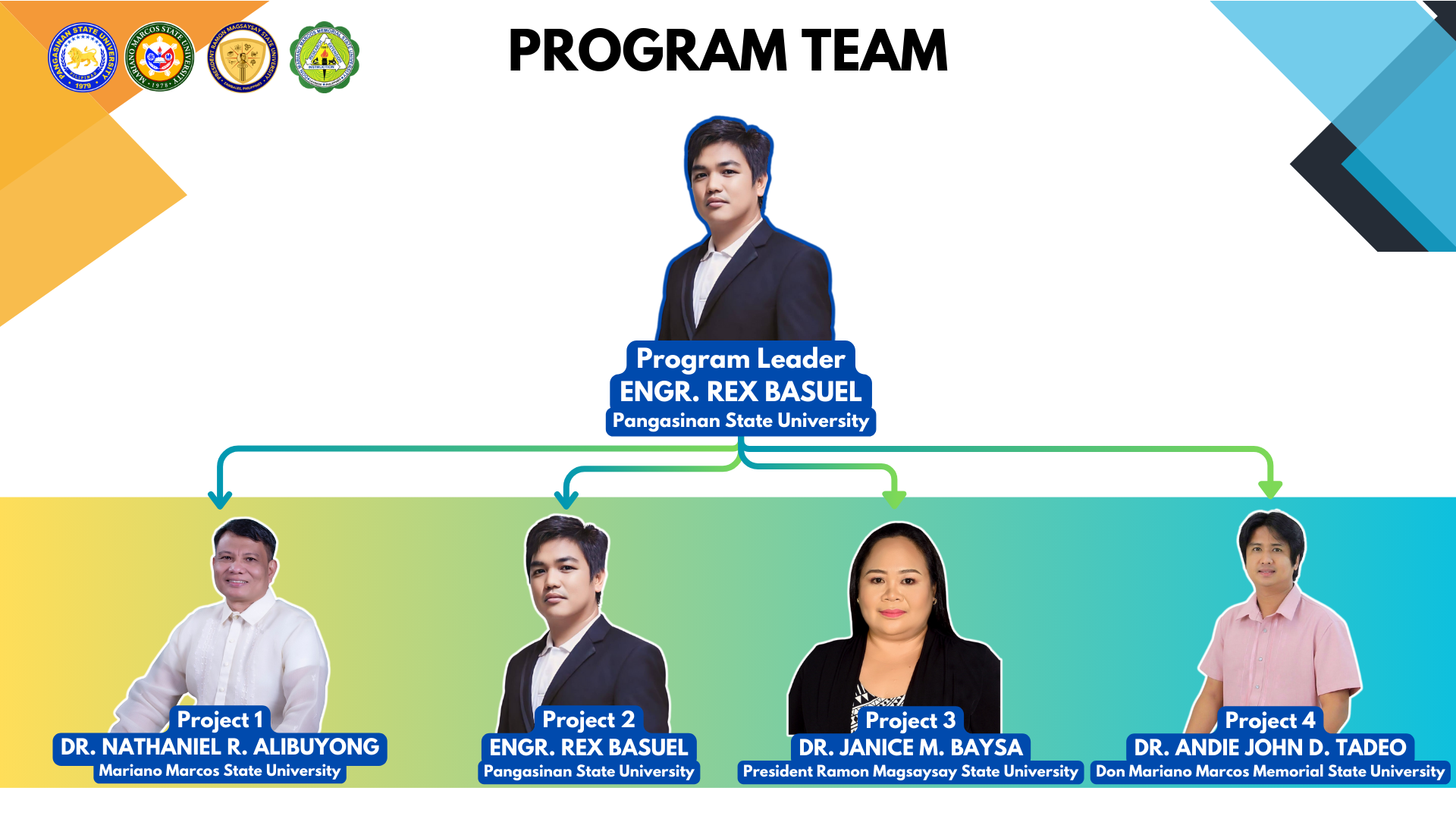PROJECTS
Development of sustainable and climate-resilient salterns: Best practices, Standardization, Site Mapping and Design of Pilot Saltern Farm
|
Project Leader: Site of Implementation: |
 |
Project Description:
The Mariano Marcos State University in collaboration with other state universities (SUCs) in Region 1 and in partnership with other research institutions in the region proposed the project on the Development of sustainable and climate-resilient salterns: Best practices, standardization, site mapping, and pilot establishment of new saltern technology. Specifically, the project aims to (1) document and assess the scientific and engineering principles of saltern design and operation, including the optimization of salt production and the reduction of environmental impacts,; (2) evaluate the salt production process, including flooding, evaporation, crystallization, harvesting, warehousing, and iodizing, to identify areas for improvement and innovation; (3) develop a menu of best practices for saltern design, operation, and management that can serve as a basis for the development of new saltern standards; (4) map potential saltern sites in the Philippines, considering environmental and social criteria, to identify areas with the greatest potential for sustainable salt production; and standardize saltern technology and practices to ensure that the salt farming industry in the Philippines operates in an environmentally sustainable and socially responsible manner, while also ensuring the long-term viability of the industry. Overall, the project hopes to develop a sustainable and climate-resilient saltern technology that will provide more economic opportunities for communities, increase salt production farms to meet future project demands and at the same time preserve the environment and support climate change adaptation.
Main Objective:
The projects aim to document the best practices, improve, and standardize solar salt farms, and identify potential saltern sites in the Philippines to serve as basis in scaling up the salt production and revitalize the salt-making industry towards a sustainable and inclusive economic growth.
Specific Objectives:
- Document and assess the scientific and engineering principles of saltern design and operation,
including the optimization of salt production and the reduction of environmental impacts. - Evaluate the salt production process, including flooding, evaporation, crystallization, harvesting,
warehousing, and iodizing, to identify areas for improvement and innovation. - Develop standard solar salt farm based on the best practices for salter design, operation, and
management. - Develop an integrated sensors to monitor salinity and manage the flow of brine solution in solar salt evaporation pond.
- Identify potential saltern sites in the Philippines, with the greatest potential for sustainable salt
production considering environmental and social criteria. - Design a pilot saltern plant based on the developed standard technology and practices to showcase salt farming industry in the Philippines which operates in an environmentally sustainable and socially responsible manner, while also ensuring the long-term viability of the industry.
Establishment of Asin R&D Center through Technology, Competence, and Services Development
|
Project Leader:
Site of Implementation: |
 |
Project Description:
Establishing the Asin R&D Center through Technology, Competence, and Services Development is the focus of this project which will be placed at Pangasinan State University. The center is staffed with competent individuals to guarantee that all the center’s salt-related research, development, innovation, and training services to the local salt industry are satisfied. The center has three divisions: Membrane Science and Separation Technology Division, Salt Division, and Process Design and Engineering Division, equipped with sophisticated equipment needed for salt analysis that allows researchers, faculty, and students to perform hands-on experiments. Highly applied research will be done at the center, such as salt, water desalination, and purification, membrane-based processes for separation and concentration. Partnerships with renowned international institutes specializing in salt production, such as India’s Central Salt & Marine Chemicals Research Institute (CSMCRI), and Japan’s Salt Industry Center, will be forged, which will surely provide access to a broader range of expertise and also bring knowledge and experience that the center lacks, and other skills to help the center grow.
Main Objective:
To provide support and address the needs of local salt industry through research and development on alternative salt production technologies, availability of salt testing facilities, technical consultancy, human resource development and S&T promotion.
Specific Objectives:
- To equip personnel with knowledge and techniques through training and international collaboration with research institutions with solid foundation in modern salt production.
- To design and develop at least 2 salt production technologies that will provide alternative solutions to the existing salt production processes.
- To establish R&D facility and salt testing and analysis capabilities
- To provide consultancy and local salt industry such as technical training/seminar/workshop, technical consultancy, and testing & analysis.
Artisan Salt Technology Innovation and Preservation
|
Project Leader: Site of Implementation: |
 |
Project Description:
The use of organically harvested salt is becoming the trend worldwide, and only a few regions are producing unique salt that can be shipped or marketed. The Philippines is endowed with vast bodies of water and gifted with unique salt variants. In the Northern part of Luzon, three exceptional premium salt are challenged to extinction that is potential for international markets equally or above the taste of salt commercialized. This pushed the President Ramon Magsaysay State University in collaboration with the various State Universities in the Coastal regions of Norther Luzon enhancing of the local salt industry particularly the artisan salt of Northern and Central Luzon while preserving its cultural practices. This focuses on increasing salt production with promising quality through the elevating the production process using various S&T techniques and interventions while preserving the artisan salt-making practices of Luzon with utmost food and health safety. This project targets to increase artisan salt production by at least 10% of its current production and revive the dying salt industry in the coastal communities of the province. Thus, generally this project imbued to provide a sustainable, safe and climate resilient strategies that will provide economic opportunities to the fishing/coastal communities while maintaining the culture of artisanal salt making.
Main Objective:
Increase salt output and produce artisan salt of the highest quality while keeping the key elements of the manufacturing process following the food safety standards and preserving the culture.
Specific Objectives:
• Profiling the artisan salt industry and produce in terms of sociodemographic profile, value-chain, and production site biota evaluation.
• Assess the spatiotemporal salinity of identified coastal areas used for artisan salt production.
• Increase artisan salt production to at least 10% of the current production using elevated seawater concentration, fractional crystallization and filtration using absorbent and enhanced evaporation process using improved clay brick furnace.
• Develop strategies for the preservation of the traditional culture of salt production.
• Train at least one community for expansion of improved artisan salt production.
• Document health status and safety condition of artisan salt farmers.
• Document and identify climate change adaptation practices.
Value Adding of Sea Salt and Utilization of its byproducts
|
Project Leader: Site of Implementation: |
 |
Project Description:
A value-added product is a saleable commodity that has been enhanced with additional qualities that make it worth a higher price than the raw materials used to make it. It may be made more convenient, more attractive, more palatable, or easier to use than its raw ingredients. The project will focus on the development of value-added products from sea salt, its use in fishery products, and utilization of its byproduct to develop another product. Sea salt that will be used in the project are salt produced at different production methods such as salt beds in pond, HDPE platform and cooking method. Gourmet salt such as flake salt will be developed and standardized. Salt will be added with fish flesh which will be used as flavor for salt. Byproduct like nigari liquid (bitter liquid/ magnesium chloride) will be collected and characterize to evaluate its use for food applications. To fully utilize the use of salt to non-food product, salt will be used to glaze the pots to enhance the color, presentation and strength of the product. It is expected that the developed product and processes will be result to development of instructional materials for dissemination. The project also aims to apply the standardized process for Utility Model (UM) and copyrights of IEC materials.
Main Objective:
Develop gourmet/specialty sea salt from different production methods, standardize and characterize its properties for human consumption, and utilize salt by-products for other uses.
Specific Objectives:
• Develop, standardize and characterize flavored salts
• Develop and evaluate product from sea salt byproduct (Nigari Liquid for food supplement and Tofu making)
• Develop Salt Glazing for clay products using Sea Salt
PROJECT 2 : Accelerating Salt Research and Innovation (ASIN) Center
PROJECT 3 : Establishment of Asin R&D Center in Pangasinan State University
Artisan Salt Technology Innovation and Preservation Project
PROJECT 4 : PROGRESS REPORT 1st Quarter (November 2023 – February 2024)
Value-Adding of Sea Salt and Utilization of its Byproducts

